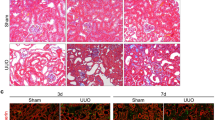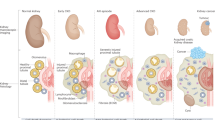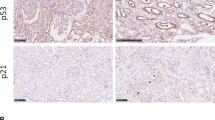Abstract
The cyclin-dependent kinase inhibitor p27Kip1 controls cell proliferation in response to normal mitogenic stimuli. We show here that p27Kip1 also safeguards against excessive cell proliferation in specific pathophysioiogic settings. We used experimental glomerulonephritis as a paradigm for immune mediated inflammation and ureteral obstruction as a model for non-immune mediated inflammation. Renal function was substantially decreased in nephritic p27−/− mice compared with control mice, and this was associated with increased glomerular cell proliferation, apoptosis and matrix protein accumulation. Tubular epithelial cell proliferation and apoptosis was also increased in p27−/− mice following ureteral obstruction. p27Kip1 may have a general role in protecting cells and tissues from inflammatory injury.
This is a preview of subscription content, access via your institution
Access options
Subscribe to this journal
Receive 12 print issues and online access
$209.00 per year
only $17.42 per issue
Buy this article
- Purchase on Springer Link
- Instant access to full article PDF
Prices may be subject to local taxes which are calculated during checkout
Similar content being viewed by others
References
Bisgaard, H.C. & Thorgeirsson, S.S. Hepatic regeneration. The role of regeneration in pathogenesis of chronic liver disease. Clin. Lab. Med. 16, 325–339 (1996).
MacLeod, D.C. et al. Proliferation and extracellular matrix synthesis of smooth muscle cells from cultured human coronary atherosclerotic and restenotic lesions. J. Am. Coll. Cardiol. 23, 59–65 (1994).
Johnson, R.J. The glomerular response to injury: Progression or resolution? Kidney Int. 45, 1769–1782 (1994).
Couser, W.G. & Johnson, R.J. Mechanisms of progressive renal disease in glomerulonephritis. Am. J. Kidney Dis. 23, 193–198 (1994).
Morgan, D.O. Principles of CDK regulation. Nature 374, 131–134 (1995).
Sherr, C.J. & Roberts, J.M. Inhibitors of mammalian G1 cyclin-dependent kinases. Genes & Dev. 9, 1149–1163 (1995).
Nourse, J. et al. Interleukin-2-mediated elimination of the p27Kip1 cyclin-dependent kinase inhibitor prevented by rapamycin. Nature 372, 570–573 (1994).
Polyak, K. et al. Cloning of p27Kip1Kip1, a cyclin-dependent kinase inhibitor and potential mediator of extracellular antimitogenic signals. Cell 78, 59–66 (1994).
Coats, S., Flanagan, W.M., Nourse, J. & Roberts, J.M. Requirement of p27Kipl for restriction point control of the fibroblast cell cycle. Science 272, 877–880 (1996).
Shankland, S.J. et al. Mesangial cell proliferation mediated by PDCF and bFGF is determined by levels of the cyclin kinase inhibitor p27Kip1 . Kidney Int. 51, 1088–1099 (1997).
Fero, M.L. et al. A syndrome of multiorgan hyperplasia with features of gigantism, tumorigenesis, and female sterility in p27Kip1-deficient mice. Cell 85, 733–744 (1996).
Nakayama, K. et al. Mice lacking p27Kip1 display increased body size, multiple organ hyperplasia, retinal dysplasia, and pituitary tumors. Cell 85, 707–720 (1996).
Kiyokawa, H. et al. Enhanced growth in mice lacking the cyclin-dependent kinase inhibitor function of p27Kip1 . Cell 85, 721–732 (1996).
Atkins, R.C., Nikolic-Paterson, D.J., Song, Q. & Lan, H.Y. Modulators of crescentic glomerulonephritis. J. Am. Soc. Nephrol. 7, 2271–2278 (1996).
Truong, L.D. et al. Cell apoptosis and proliferation in experimental obstructive uropathy. Kidney Int. 50, 200–207 (1996).
Wang, J. & Walsh, K. Resistance to apoptosis conferred by Cdk inhibitors during myocyte differentiation. Science 273, 359–361 (1996).
Porter, P.L. et al. Expression of cell-cycle regulators p27Kp1 and cyclin E, alone and in combination, correlate with survival in young breast cancer patients. Nature Med. 3, 222–225 (1997).
Catzavelos, C. et al. Decreased levels of the cell cycle inhibitor p27Kip1 protein: Prognostic implications in primary breast cancer. Nature Med. 3, 227–230 (1997).
Loda, M. et al. Increased proteasome-dependent degradation of the cyclin-dependent kinase inhibitor p27 in aggressive colorectal carcinomas. Nature Med. 3, 231–234 (1997).
Salant, D.J., Darby, C. & Couser, W.C. Experimental membranous glomerulonephritis in rats. j, Clin. Invest. 66, 71–81 (1980).
Couser, W.G.D.C., Salant, D.J., Adler, S., Stilmant, M.M. & Lowenstein, L.M. anti-GBM antibody-induced proteinuria in isolated perfused rat kidney. Am.J. Physiol. 249, 241–250 (1985).
Butler, A.R. Jaffe reaction. Identifcation of the colored species. Clin. Chim. Ada. 59, 227–232 (1975).
Bradley G.M. & Benson E.S. Examination of the Urine. (WB Saunders, 1974).
Shankland, S.J. et al. Changes in cell cycle protein expression during experimental mesangial proliferative glomerulonephritis. Kidney Int. 50, 1230–1239 (1996).
Baker, P.J. et al. Depletion of C6 prevents development of proteinuria in experimental membranous nephropathy in rats. Am. J. Pathol. 135, 185–194 (1989).
Shankland, S.J. et al. Cyclin kinase inhibitors are increased during experimental membranous nephropathy: potential role in limiting glomerular epithelial cell proliferation in vivo. Kidney Int. 52, 404–413 (1997).
Kerr, P.G., Lan, L.H. & Atkins, R.C. Diseases of The Kidney 6th edn (ed. Schrier RW, G.C.) 1619–1644 (Little, Brown, and Company, 1997).
Thomas, S.E. et al. Tubulointerstitial disease in aging: evidence for underlying peritubular capillary damage, a potential role for renal ischemia. J. Am. Soc. Nephrol. 9, 231–242 (1998).
Huang, X.R., Tipping, P.G., Li, S. & Holdsworth, S.R. TH1 responsiveness to nephritogenic antigens determines susceptibility to crescentic glomerulonephritis in mice. Kidney Int. 51, 94–103 (1997).
Wolf, N.S., Kone, A., Priestley, G.V. & Bartelmez, S.H. In vivo and in vitro characterization of long-term repopulating primitive hematopoietic cells isolated by sequential Hoechst 33342-rhodamine 123 FACS selection. Exp. Hematol. 21, 614–622 (1993).
Author information
Authors and Affiliations
Rights and permissions
About this article
Cite this article
Ophascharoensuk, V., Fero, M., Hughes, J. et al. The cyclin-dependent kinase inhibitor p27Kip1 safeguards against inflammatory injury. Nat Med 4, 575–580 (1998). https://doi.org/10.1038/nm0598-575
Received:
Accepted:
Issue Date:
DOI: https://doi.org/10.1038/nm0598-575
This article is cited by
-
Enhanced Prediction and Characterization of CDK Inhibitors Using Optimal Class Distribution
Interdisciplinary Sciences: Computational Life Sciences (2017)
-
Unilateral ureteral obstruction: beyond obstruction
International Urology and Nephrology (2014)
-
Roles of the Skp2/p27 axis in the progression of chronic nephropathy
Cellular and Molecular Life Sciences (2013)
-
The role of the ubiquitin–proteasome system in kidney diseases
Clinical and Experimental Nephrology (2012)
-
Darbepoetin alfa protects podocytes from apoptosis in vitro and in vivo
Kidney International (2007)



